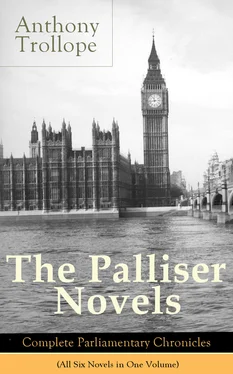In this employment he remained for another period of five years, and was supposed by all his friends to be doing very well. And indeed he did not do badly, only that he did not do well enough to satisfy himself. He was ambitious of making the house to which he belonged the first house in the trade in London, and scared his partners by the boldness and extent of his views. He himself declared that if they would only have gone along with him he would have made them princes in the wine market. But they were men either of more prudence or of less audacity than he, and they declined to walk in his courses. At the end of the five years Vavasor left the house, not having knocked any one down on this occasion, and taking with him a very nice sum of money.
The two last of these five years had certainly been the best period of his life, for he had really worked very hard, like a man, giving up all pleasure that took time from him,—and giving up also most pleasures which were dangerous on account of their costliness. He went to no races, played no billiards, and spoke of Cremorne as a childish thing, which he had abandoned now that he was no longer a child. It was during these two years that he had had his love passages with his cousin; and it must be presumed that he had, at any rate, intended at one time to settle himself respectably as a married man. He had, however, behaved very badly to Alice, and the match had been broken off.
He had also during the last two years quarrelled with his grandfather. He had wished to raise a sum of money on the Vavasor estate, which, as it was unentailed, he could only do with his grandfather’s concurrence. The old gentleman would not hear of it,—would listen with no patience to the proposition. It was in vain that George attempted to make the squire understand that the wine business was going on very well, that he himself owed no man anything, that everything with him was flourishing;—but that his trade might be extended indefinitely by the use of a few thousand pounds at moderate interest. Old Mr Vavasor was furious. No documents and no assurances could make him lay aside a belief that the wine merchants, and the business, and his grandson were all ruined and ruinous together. No one but a ruined man would attempt to raise money on the family estate! So they had quarrelled, and had never spoken or seen each other since. “He shall have the estate for his life,” the squire said to his son John. “I don’t think I have a right to leave it away from him. It never has been left away from the heir. But I’ll tie it up so that he shan’t cut a tree on it.” John Vavasor perhaps thought that the old rule of primogeniture might under such circumstances have been judiciously abandoned—in this one instance, in his own favour. But he did not say so. Nor would he have said it had there been a chance of his doing so with success. He was a man from whom no very noble deed could be expected; but he was also one who would do no ignoble deed.
After that George Vavasor had become a stockbroker, and a stockbroker he was now. In the first twelve months after his leaving the wine business,—the same being the first year after his breach with Alice,—he had gone back greatly in the estimation of men. He had lived in open defiance of decency. He had spent much money and had apparently made none, and had been, as all his friends declared, on the high road to ruin. Aunt Macleod had taken her judgement from this period of his life when she had spoken of him as a man who never did anything. But he had come forth again suddenly as a working man; and now they who professed to know, declared that he was by no means poor. He was in the City every day; and during the last two years had earned the character of a shrewd fellow who knew what he was about, who might not perhaps be very mealy-mouthed in affairs of business, but who was fairly and decently honourable in his money transactions. In fact, he stood well on ‘Change.
And during these two years he had stood a contest for a seat in Parliament, having striven to represent the metropolitan borough of Chelsea, on the extremely Radical interest. It is true that he had failed, and that he had spent a considerable sum of money in the contest. “Where on earth does your nephew get his money?” men said to John Vavasor at his club. “Upon my word I don’t know,” said Vavasor. “He doesn’t get it from me, and I’m sure he doesn’t get it from my father.” But George Vavasor, though he failed at Chelsea, did not spend his money altogether fruitlessly. He gained reputation by the struggle, and men came to speak of him as though he were one who would do something. He was a stockbroker, a thoroughgoing Radical, and yet he was the heir to a fine estate, which had come down from father to son for four hundred years! There was something captivating about his history and adventures, especially as just at the time of the election he became engaged to an heiress, who died a month before the marriage should have taken place. She died without a will, and her money all went to some third cousins.
George Vavasor bore this last disappointment like a man, and it was at this time that he again became fully reconciled to his cousin. Previous to this they had met; and Alice, at her cousin Kate’s instigation, had induced her father to meet him. But at first there had been no renewal of real friendship. Alice had given her cordial assent to her cousin’s marriage with the heiress, Miss Grant, telling Kate that such an engagement was the very thing to put him thoroughly on his feet. And then she had been much pleased by his spirit at that Chelsea election. “It was grand of him, wasn’t it?” said Kate, her eyes brimming full of tears. “It was very spirited,” said Alice. “If you knew all, you would say so. They could get no one else to stand but that Mr Travers, and he wouldn’t come forward, unless they would guarantee all his expenses.” “I hope it didn’t cost George much,” said Alice. “It did, though; nearly all he had got. But what matters? Money’s nothing to him, except for its uses. My own little mite is my own now, and he shall have every farthing of it for the next election, even though I should go out as a housemaid the next day.” There must have been something great about George Vavasor, or he would not have been so idolized by such a girl as his sister Kate.
Early in the present spring, before the arrangements for the Swiss journey were made, George Vavasor had spoken to Alice about that intended marriage which had been broken off by the lady’s death. He was sitting one evening with his cousin in the drawing-room in Queen Anne Street, waiting for Kate, who was to join him there before going to some party. I wonder whether Kate had had a hint from her brother to be late! At any rate, the two were together for an hour, and the talk had been all about himself. He had congratulated her on her engagement with Mr Grey, which had just become known to him, and had then spoken of his own last intended marriage.
“I grieved for her,” he said, “greatly.”
“I’m sure you did, George.”
“Yes, I did;—for her, herself. Of course the world has given me credit for lamenting the loss of her money. But the truth is, that as regards both herself and her money, it is much better for me that we were never married.”
“Do you mean even though she should have lived?”
“Yes;—even had she lived.”
“And why so? If you liked her, her money was surely no drawback.”
“No; not if I had liked her.”
“And did you not like her?”
“No.”
“Oh, George!”
“I did not love her as a man should love his wife, if you mean that. As for my liking her, I did like her. I liked her very much.”
“But you would have loved her?”
“I don’t know. I don’t find that task of loving so very easy. It might have been that I should have learned to hate her.”
Читать дальше












